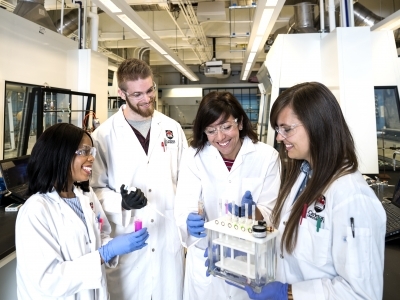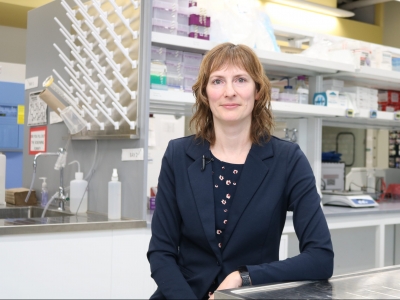–Story written by Mitch Jackson
Even when incredibly complex subjects like particle physics and the fundamental laws of nature are involved, the best ideas come up over a simple cup of coffee.
This observation comes from Carleton student Graham Cree, who hopes to complete his PhD in Particle Physics in April, and is part of the Carleton ATLAS Group. The group may be best known for its part in the discovery of the Higgs boson particle – a particle that is believed to be responsible for giving mass to all the particles in the universe.

For Cree and other current students and faculty working within the ATLAS Group, that discovery was just the starting point for even more groundbreaking research.
“When I first started working on ATLAS, this was shortly before the Higgs boson discovery, so there was a large enthusiasm, momentum, and excitement behind this search,” said Cree.
This momentum has carried over to other areas of research and inquiry.
Since the discovery of the Higgs boson particle, Cree has been working to measure its properties.
“Working on Higgs boson property measurement is sort of a natural extension to the discovery of the particle,” said Cree. “The Higgs boson mass has been measured before, but what I have developed is a technique which will be both a more precise measurement, and a more reliable measurement.”
This research is important to the Standard Model of particle physics which explains how the basic building blocks of matter interact. According to the model, everything in the universe is made from a small set of fundamental particles which interact with three of the four “fundamental forces”.
To the average layman this may sound overwhelming and intimidating but Cree has found this research to be incredibly fun.
“I find the work engaging and challenging, and I like the people I work with – people are available to bounce ideas off, or suggest things you missed, and so it’s definitely not a field you can get bored in,” he said.
Cree has been able to travel 10 times throughout his degree to CERN (the European Organization for Nuclear Research) which is located along the Franco-Swiss border near Geneva.
CERN, according to Cree, resembles in some respects an entire university dedicated to physics.
“CERN can be quite lively and sometimes a bit hectic running up to our big conferences each year; it’s definitely not unusual to see the offices and coffee areas still busy very late into the night.”
“I think this is the natural consequence of bringing people passionate about their work together in one place.”
Cree completed his undergraduate degree in Physics at Carleton, in the theory stream. He started as a Master’s student, but did the fast-track-to-PhD program after his first year. He has been awarded the Hamlin Graduate Fellowship from Carleton, as well as an NSERC Post-Graduate Scholarship for the last 3 years.
Despite all of this, Cree is far from slowing down. He is currently looking at research opportunities on ATLAS and other experiments.
“Being such a huge experiment means there are many unique areas to work on ATLAS, from hardware, electronics, software, and analysis,” said Cree.
There is a broad diversity of research projects on ATLAS, so the coffee will continue to brew as more breakthroughs are made.
More information about the PhD in Physics is available by clicking here.
Thursday, January 19, 2017 in News, Research
Share: Twitter, Facebook



